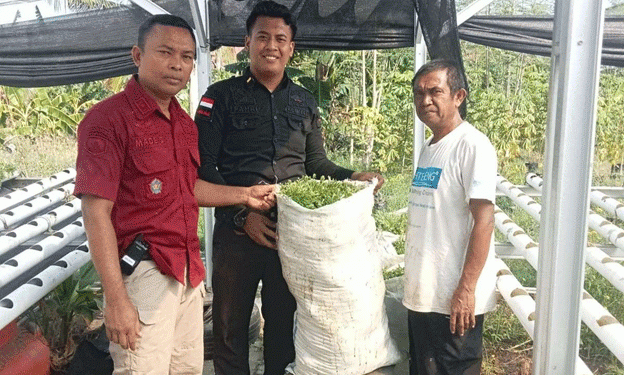In a remarkable display of resilience and innovation, inmates at Lapas Kelas IIA Palu in Central Sulawesi, Indonesia, have successfully transformed their limited prison yard into a productive hydroponic vegetable farm. On October 26, 2024, the facility celebrated a bountiful harvest of 70 kg of fresh lettuce, demonstrating how agriculture can thrive even within the confines of a correctional institution.
A New Model of Rehabilitation
According to Makmur, the head of Lapas Palu, this hydroponic farming initiative goes beyond merely filling time for the inmates. It is a critical component of their rehabilitation process, aimed at equipping them with practical skills that can aid their reintegration into society upon release. “We want to provide skills that will be useful for them after they are free,” Makmur stated, emphasizing the dual purpose of the program: enhancing food security and preparing inmates for a productive future.
Hydroponic farming, which allows for growing plants in nutrient-rich water rather than soil, has gained popularity in urban and space-limited settings. It can produce high yields with minimal water usage, making it an ideal solution for areas with limited arable land. The recent global push towards sustainable agriculture and food security highlights hydroponics as a viable method to meet these challenges. In Indonesia, initiatives like this not only contribute to local food production but also help in promoting self-sufficiency.
Economic and Social Impact
The fresh lettuce harvested is not only consumed by the inmates but is also sold to the local community, creating a source of income for the facility. This entrepreneurial aspect is crucial for developing a sustainable model that benefits both inmates and the surrounding population. Hermansyah Siregar, the head of the Central Sulawesi office of the Ministry of Law and Human Rights, praised the initiative as part of a broader effort to empower inmates and support national food security goals. He noted, “Through various independence programs, WBP at Lapas Palu are continuously encouraged to develop their potential and skills.”
The hydroponic farming project is aligned with the national focus on food security and agricultural innovation. It reflects a commitment to rehabilitation programs that foster independence and skill development among inmates. Such initiatives not only aim to reduce recidivism rates but also provide inmates with the tools they need to rebuild their lives and contribute positively to society after their release.
The hydroponic farming program at Lapas Kelas IIA Palu serves as an inspiring example of how innovative agricultural practices can be integrated into rehabilitation efforts within correctional facilities. By equipping inmates with essential farming skills, the program promotes food security while also preparing them for a successful reintegration into society. As Lapas Palu continues to develop this initiative, it highlights the transformative power of agriculture as a means of empowerment and sustainability, proving that even in the most challenging environments, growth and renewal are possible.












